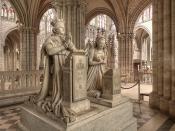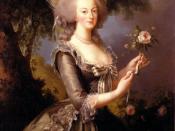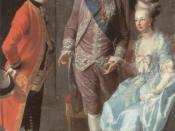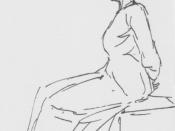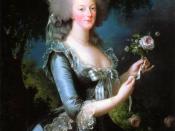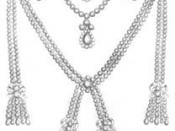France was categorized by 3 estates: First estate was the clergy, second estate was the noble and third estate was commoners. Before the French Revolution, the total population in France was between 24-26 million. 130,000 were clergy, 500,000 were nobles, and the rest were commoners. The third estate was 96% of the total population.
Although the number of clergy was insignificant in France, they had influences contradicted to their numbers. The church was an organization itself, or a country within a country. The church had its own administrative body, vast land, and court of laws. The church was very wealthy at that time. It had great income from the crops of the land, donations and gifts from the nobles, and fees like registration of birth and death.
The second estate consisted of born nobles. They were exempted from the heaviest direct tax and enjoyed other preferential exemption of country duties.
Only the nobles could hold highest position in civil administration, military, naval, and diplomatic services. Due to the expansion of international trade, wealthy middle class non-nobles arose. They obtained their noble status by intermarriage, purchased nobility patent or purchased administrative office position.
In the third estate, there were two categories. One was the new middle class during Louis XVI era, called bourgeoisise. International trade boomed in the 18th century, both in volume and value. People traded along the Atlantic and Meditteranean. They invested the money they earned in refining and processing plants, finance and insurance, and advanced industries. They were wealthy new business elite, scholars, or lawyers. Some of them became nobles through "purchase" and intermarriage.
The booming in trade created new rules and restrictions to the country, retarded the economic unification. The scope of people was widen. The bourgeoisise, like lawyers, are highly educated. The international trade changed their ways of thoughts about France.
Most of the population was poor peasants in the Third Estate. They rent or lease the land from the church, noble or bourgeoisise to do agriculture, such as growing grains or grapes. They were uneducated. They were the ones who pay the direct tax and did not get exemption from other country duties. The life of the peasants were miserable. Even in good times, there were beggars on the side of the road.
In 1776, the grain price increased. The landlord had to raise the rents or leases. The peasants could not afford to pay the high price. There was a boom in industry, like textile production, unemployment increased.
In 1788 winter, those poor peasants rioted for bread, work and living wages. The bourgeoisise supported them. They had "confidence in the ability of man to change things for the better." Financial Condition of the Royal It traced back to Louis XIV, the Sun King, spent lots of money in wars and building extraordinary Versailles. Louis XV spent money on wars. In private life, he spent a lot in his mistress, like Madame de Pompadour and Madame du Barry . He left a huge royal debt to Louis XVI when after his death.
Louis XVI understood the royal financial problem. He kept his best to maintain the balance in his financial statements. However, his beloved brother Comte d'Artois and his wife Marie Antoinette were big spenders, and asked Louis XVI for money when they ran out of it. Louis XVI gave them money because of love. Whatever Louis XVI saved could never balance the expenditure of those people.
Marie Antoinette's marriage with Louis XVI was the arrangement by Louis XV and Empress Marie Theresa from Austria in order to stop the years of wars. Marie Antoinette felt loneliness after she left Austria. Madame de Polignac became the best friend of Queen Marie Antoinette. In order to make her friend happy, Marie Antoinette spent money to improve Madame de Polignac's living standard. She also spent money on clothes and diamonds to satisfy her desire. Although Marie Antoinette did not purchase the diamond necklace, in the Diamond Necklace Affair , people concluded that she spent France's money disregard the terrible living situation of her citizens. People gave her the name "Madame Deficit".
Economic Condition of France The leadership of Louis XVI was weak, and so was the prime minister. The officers of government offices were held by the nobles, who only considered for their luxury lives. Most of the finance ministers in Louis XVI era were nobles, except Jacques Necker, a Swiss banker in France. The regional administration was lacked of uniformity, the legal system was highly corrupted.
Worst of all, the taxation system was the remainder of the old royal system and did not adjust of the change of France environment. Direct taxes, which were the main taxation of France, was levied on the peasants, the nobles were exempted from it. There were also indirect taxes, was caused the burden of the peasants worse.
The annual revenue could not compensate the expenditure of the royal. The deficit grew larger every year. The continue increase in tax could not solve the deficit problem. Prices were risen because of the high taxation. Between 1785-1789, the prices had risen 65%, but the wages were only 22%. Many people lost their jobs because of the high taxation and the transformation of the society from agricultural to industrial.
Louis XVI (1754-93) King of France. He married to Marie Antoinette on 1770, became King of France in 1774, called Estate General in 1789, escaped unsuccessfully, took the oath of Constitution in 1791, arrested and tried in 1792, gullotined in 1793.
As a King, he was too weak. But he was not a fool. He had good ideas and made good judgments, which is slightly different from RoV. However, he was self-distrustful in his public image.
Louis XVI liked locksmithing. It looked funny in the episodes, but it was actually the gentlemen practice to learn manual craft during that time. One reason he loved locksmithing was his concern of having things safely locked. He wanted to keep his private paper out of Mercy's sight.
He controlled his personnel finance well, he bookkeeper his expenditure, and tried to use not as much as possible. However, his brother was a big spender, and asked Louis for money all the time. Since Louis was nice to his loved ones, he often gave his brother money, which in no way could compensate by his savings. His wife Marie Antoinette spend a lot of money on gambling one time. But since he loved her so much, he gave her the money even though its against his principle of "using other's money to gamble".
He was tried by the republic and gullotined in 1793.
